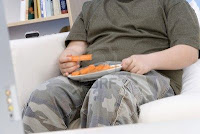Interesting study coming out of Massachusetts, where a team of a Harvard gastroenterologist and a New York artist have collaborated to show us what it looks like when the human digestive system breaks down processed food.
 |
| M2A capsule |
The video below was shot using the mouth-to-anus or M2A capsule, which contains a camera, light-emitting diodes and a transmitter. Using bluetooth technology it transmits images from the GI tract to a receiver pack worn by the subject. The study also took advantage of technology called the Smartpill Capsule that measured pressure, temperature and pH of the GI tract.
The team wanted to see if there were differences between the way the GI tract digests whole foods and processed foods. The whole foods consisted of homemade chicken stock with handmade noodles, hibiscus Gatorade, and pomegranate/cherry juice gummy bears. The processed foods included Top Ramen chicken, blue Gatorade and gummi bears.
The test was first run in June 2011 with one subject eating the whole foods and the other eating processed foods. The test was run a second time in September with the subjects switching the foods they ate. The pills were consumed right before the food. Watch the video to see the results. Fascinating…














